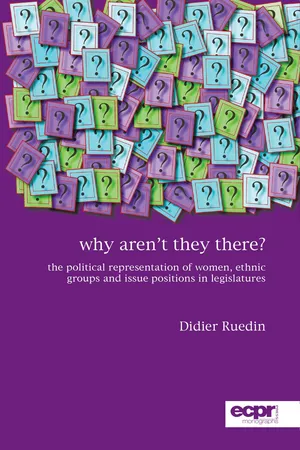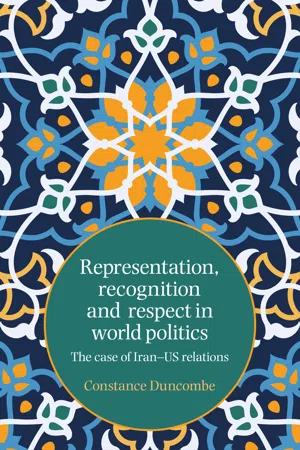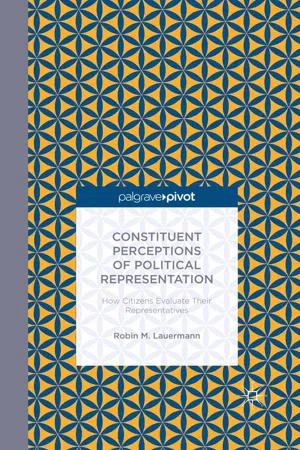Politics & International Relations
Models of Representation
Models of representation refer to the different ways in which individuals or groups are represented in political systems. These models can include descriptive representation, where representatives share the characteristics of those they represent, and substantive representation, which focuses on the actions and policies of representatives. The models of representation help to understand how diverse interests and perspectives are incorporated into political decision-making.
Written by Perlego with AI-assistance
Related key terms
Related key terms
1 of 4
Related key terms
1 of 3
6 Key excerpts on "Models of Representation"
- eBook - ePub
Why aren't they there?
The Political Representation of Women, Ethnic Groups and Issue Positions in Legislatures
- Didier Ruedin(Author)
- 2016(Publication Date)
- ECPR Press(Publisher)
chapter one political representation: a framework The concept of political representation is often used in the literature, but its exact meaning is rarely examined in detail (Birch 1971; Eulau and Wahlke 1978; Blondel et al. 1997; Brennan and Hamlin 1999; Miller et al. 1999). 1 When looking at the concept in detail, it becomes clear that there is no single understanding (Pitkin 1967; Brennan and Hamlin 1999). It is therefore helpful to reflect on the different notions of representation. It is the central concept of this book and this chapter unpacks its complexity, bringing together the varied approaches into a comprehensive understanding of political representation. The chapter begins by looking at the different components of the concept of representation, which helps to define the scope of this book. The role of representatives is investigated, as well as which characteristics should be represented. This discussion builds towards the theoretical framework by selecting the forms of representation most relevant to the empirical analysis. The framework itself is a new synthesis of previous contributions and forms the basis for the chapters that follow. Whilst the framework integrates different facets of representation, it does not attempt to provide a comprehensive theory. It is a tool to inform the hypotheses presented at the end of the chapter. What is representation? Whilst political representation is frequently studied, surprisingly few contributions work towards a better understanding of its meaning. In this book, representation in legislatures refers to a case of political representation. At its most general, representation is defined as ‘[being] present on behalf of someone else who is absent’ (Britannica 2006a). In the context of politics, this describes ‘the idea that people, while not in person present at the seat of government are to be considered present by proxy’ (Ford 1925: 3) - eBook - ePub
Representation, recognition and respect in world politics
The case of Iran-US relations
- Constance Duncombe(Author)
- 2019(Publication Date)
- Manchester University Press(Publisher)
Introduction: Representation, recognition and respect in world politicsRepresentations help us to make sense of our world by giving meaning to events and experiences and the actions of others. These representations are not stagnant, however, and we are not the only ones who use them to understand ourselves and things external to us. Our Others also use representations in the same way. Each of us feels differently about the representations ascribed to us, particularly when they consist of an image of ourselves that we do not like. When we are represented and recognised in a way we disagree with, it is sometimes experienced as disrespect and is framed in an emotional context of insult, humiliation, anger and betrayal. We might then act in a particular way that seeks to undo this form of recognition, or misrecognition, in order to regain a level of respect that we feel we deserve.Representation plays a central role in the intersubjective dynamics of identity politics. When we think about who we are, we think about ourselves in a particular way. We think about other people in a similar fashion. We use representations – the production of meaning through language, symbols or signs, a conveyance of something – to imagine who we are and how we want to be recognised. These issues matter not just to individuals but to states as well: representation occurs at both the level of the individual and the state. States use representation to understand not only themselves and others but also to respond to externally constructed images of who they are.The main objective of my book is to demonstrate how representation and recognition influence foreign policy. In order to do so, I explore the connection between representations and recognition and how these are informed by feelings of respect or disrespect that instigate the projection or protection of state identity. - eBook - ePub
Political Representation in Indonesia
The Emergence of the Innovative Technocrats
- Michael Hatherell(Author)
- 2019(Publication Date)
- Routledge(Publisher)
Critiques of contemporary electoral democracies do, however, suggest the need to separate the practice of representation from the institutional embodiment of representation. Representative political systems that actively subdue opportunities for participation and engagement warrant critique. At the same time, it is important to recognise the continued existence of practices of representation that are not necessarily unnatural or a detrimental aspect of democracy. Of course, in the context of Indonesian politics, the adoption of formal representative political institutions at all levels of government means that studying the way in which political representation is conducted is important. Yet there is more at stake here than simply measuring the effectiveness of purportedly representative institutions. By focusing on the ideational elements of representative claim-making, we are better able to explore how practices and shared understanding of representation impact the nature of a polity like Indonesia.Representative claims and repertoires
As the previous sections have suggested, this book is based on a constructivist foundation – that is, the way in which societies and individual humans construct a shared understanding of politics is consequential. Politics is, according to this approach, not a discoverable entity waiting to be scientifically analysed by the objective observer, but instead is created through human interaction. It follows, therefore, that political representation, or the notion that one human or group of individuals can act politically on behalf of others, emerges because of the way in which individuals and societies collectively understand it.It is important then to assess the form this understanding takes and how it is contested. As argued previously, ideas and narratives play an important role in shaping human understanding and perspective. As Mayer (2014, p. 65) argues, theextent to which we are biologically wired for narrative has long fascinated those who have observed the ubiquity of storytelling. Scholars of mythology and folklore, most prominently Joseph Campbell, fascinated with the psychology of Freud and, especially, Jung, saw in the common structures of myth a reflection of the fundamental structure of the human mind. - eBook - ePub
- Monica Brito Vieira, David Runciman(Authors)
- 2013(Publication Date)
- Polity(Publisher)
But Bono’s claim to speak for the poor of Africa takes us beyond the nation-state. It rests on two other, relatively novel, features of political representation. First, in some parts of the world the state has failed, or is failing, to represent its citizens. However well the state may be able to represent individuals in theory, in practice some states lack even the basic rudiments of power needed to make their representation claims plausible. The ‘gap’ between the represented and their political representatives is just too wide. In these circumstances, the representation provided by alternative bodies, including NGOs and other kinds of international organizations, may become, and may need to become, more significant. Second, even the successful and stable states of the affluent West are increasingly finding themselves constrained by transnational schemes or networks in which their representative status is being reconfigured. States are subject to new sorts of limitations on their ability to speak for their citizens. Some of these limitations derive from the expansion of the role of international law. Others derive from the wide range of international bodies in which states must themselves be represented and through which they can find themselves spoken for. These new constraints – or opportunities – for political representation in the international sphere, between and beyond states, are the subject of the next chapter.Passage contains an image
6 Representation Beyond the Nation-StateFor most of the history of modern politics, arguments about political representation have revolved around the state. But from the second half of the twentieth century on, state representation has increasingly had to co-exist with the various other forms of political representation that have been proliferating outside it. These involve both interstate and non-state agencies, and raise questions parallel to those we saw arising within states, concerning rival claims to representation but at a higher level of complexity. This additional complexity arises for two main reasons. First, international groups are by definition more complex than national groups, if only because they contain different nationalities among their members. Second, representative politics at the international level introduces a new dimension to the competition to represent the citizens of nation-states. This is the competition that may arise between states and rival claimants to their role as the ultimate arbiter of their citizens’ interests. - eBook - ePub
Convincing Political Stakeholders
Successful Lobbying Through Process Competence in the Complex Decision-making System of the European Union
- Klemens Joos(Author)
- 2023(Publication Date)
- Wiley-VCH(Publisher)
Focus in this case is being placed on economic models which base individual behaviour on cost/benefit calculations. 161 In political science, this concept is above all used in the rational choice theories, according to which the actors follow their preferences in accordance with benefit-maximising procedures. Action options are analysed under the given prerequisites, opportunity and transaction costs are compared and the best option is selected (with regard to the problem of applying economic models on political processes and decision-making, see Chapter 4). Here, the political system and interest representation are subjected to a process-oriented approach. 162 As in the case of economic models, political approaches can also use products and goods as the basis. This concept makes use of exchange theory. 163 As its basis, it assumes that the interaction of actors, following the – economic – law of supply and demand, is based on the exchange of goods in the sense of e.g. services, knowledge or information. The fact that both actors benefit from the exchange, albeit not necessarily to the same extent, is of significant importance in this. 164 On this basis, interdependence between the actors can actually arise if one actor's goods are vital for the other to achieve its objectives. 165 Following this approach, political interest representation is conceived as an exchange relationship between private (companies, stakeholders and organisations) and political actors, whose most important goods are information on the one hand and involvement in political decision-making or advantageous decisions on the other hand - eBook - ePub
Constituent Perceptions of Political Representation: How Citizens Evaluate Their Representatives
How Citizens Evaluate their Representatives
- R. Lauermann(Author)
- 2013(Publication Date)
- Palgrave Pivot(Publisher)
1 The Nature of RepresentationAbstract :Representation is a central feature of modern democracies. Direct democracy, a classical vision, is not feasible for practical and philosophical reasons. However, there are many conceptions of representative government—descriptive, symbolic, consent, non-functional—none of which adequately captures the essential characteristics of the process. Drawing from strengths found in several conceptions, representation is best captured as a three-stage process: consent, responsiveness and accountability. This conception also allows for independence of representatives, citizen input, expectations of deliberation and repeated elections to provide for more effective decision-making. Member responsiveness is multifaceted—policy, service, allocative, symbolic—and constituent evaluations of these behaviors have been neglected in the literature.Lauermann, Robin M. Constituent Perceptions of Political Representation: How Citizens Evaluate Their Representatives . New York: Palgrave Macmillan, 2014. DOI : 10.1057/9781137400437.0005.Whether the focus of research is the British Parliament, Congress or a state legislature, representation in lawmaking is the central function performed by legislatures (Davidson 1969). In the United States, as intended by our founders who drew inspiration from the writings of John Locke, Congress is the “most representative of our national political institutions” (Fenno 1978, 244). However, as constructed, our constitution was not intended by its Federalist creators to provide for representatives who simply serve as puppets of popular rule, rather they anticipated “that the public voice, pronounced by the representatives of the people, will be more consonant to the public good than if pronounced by the people themselves, convened for the purpose” (Madison 1999, 50). Our system is not alone in this regard.
Index pages curate the most relevant extracts from our library of academic textbooks. They’ve been created using an in-house natural language model (NLM), each adding context and meaning to key research topics.
Explore more topic indexes
Explore more topic indexes
1 of 6
Explore more topic indexes
1 of 4





